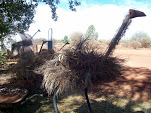Non-indigenous rural Australians are concerned with maintaining or strengthening sense of community. They do not want the vitality or the viability of their town to be undermined. There seems to be an increased focus on stimulating economic diversity and growth in order to create a more vibrant community.
There is a strong focus on the quality of life that rural living provides. No one wants to leave because they enjoy the rural lifestyle, but they are concerned that fewer people are around, available, or willing to contribute and therefore their quality of life is threatened.
For Indigenous Australians, the threat IS the reality, when compared to their non-indigenous neighbours. I won't bore you with statistics, as these are the obvious, quantifiable signs of inequity. So I'm not here to argue that Indigenous Australians are disadvantaged, this is already a given, I just wanted to point out how this inequity has shown itself in my research.
As I've already mentioned, non-indigenous Australians lament the loss of population because this has meant that there are fewer people to provide services, events and activities for the community than there was before. Rural towns are considered lucky if they can still manage to get enough players for one football team, others are happy that at least the tennis is still going... even though they only play socially now. This is not to mention the contribution of service clubs, charity organisations, action groups, or other community groups. Rural Australia must have been an extremely vibrant place to live when all of these activities were at their peak.
However, even in its hey-day, this experience was NOT the experience of rural Indigenous people. Indigenous Australians were confined to reserves or sent to missions. They now live in established towns or in Indigenous Communities (which are still not recognised as town sites in their own right, despite the presence of schools and other community facilities). The past treatment and injustices experienced by Indigenous Australians has carried on over several generations through drug and alcohol abuse, social problems and racism.
Non-indigenous rural Australians are using the arts in economic development, as a buffer for the changing economic and social make-up of their communities, and to facilitate and make the best use of existing social networks.
Indigenous Australians are using the arts to deal with trauma and address social problems, to reconnect with their culture, re-establish a sense of place and forge a common identity.

I spoke to an Indigenous elder who told me that "Australia is racist":
"Having ATSIC, the Department of Aboriginal Affairs, the fact that having a Department of Aboriginal Affairs proves that Australia is racist. If we’re all Australians we shouldn’t have one department for one mob. Community welfare means community welfare, community health means community health. There should be no need for Aboriginal Medical Service. It's there because somebody missed out on doing their job. So it’s a two-way thing, the white fella getting lazy and he's racist. So, you have an Aboriginal Legal Service (we shouldn’t), because the ordinary legal service isn’t doing its job... So Australia is built on racism. If we’re all equal, well we be equal."
When I started this research, I wouldn't have thought that the issues could have been so "black and white", but they are. I made a concerted effort to make sure I got an Indigenous perspective on this research, but it wasn't as easy as arranging interviews with non-indigenous representatives. I needed to be flexible with both my time and my approach. I needed to listen to the experience of others. I needed to be extremely conscious of establishing mutual respect and trust, so assumptions weren't made about MY intentions.
Inequity, experienced in any aspect (race, gender, etc.), can be addressed as long as it is first recognised and then ACTIVELY examined. You must be fully aware that relying on previous experience may in fact be perpetuating inequity, therefore you must recognise existing prejudices (including your own), be prepared to be unprepared, in other words, be flexible and keep an open mind.



